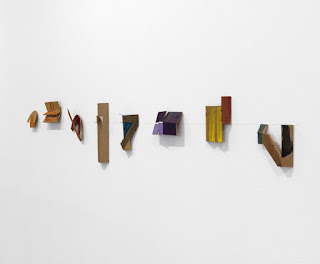NORRIS – ADV PTG – PROJECT 1 - ABSTRACT
OBJECTS
This project’s
purpose is two-fold: 1) to introduce us to abstract painting by examining its
connection to observational painting and 2) to get the semester ball rolling
with a quick, small project that will get us back in the studio and working.
Abstraction, put simply, means removing something
from its original source. If you think about, talk about, take a photo of or
make a drawing of an object, those ideas, words, photographs or drawings are
not the object itself; they are all, on some level, an abstraction of that
original object. However when we think about “abstraction” in terms of
painting, we tend to think of something else. Paint splatters, huge swaths of
color, energetic gestures or geometric patterns come to mind. Therefore, to
really begin investigating abstraction, we need to first examine what
abstraction really means and how in fact it can mean many things at once. This
project is designed to get us thinking about these issues through a simple
exercise.
First, we are each going to make a simple “abstract object”
sculpture. Choose a basic, easily workable material (cardboard, wood,
construction paper, etc). Use your chosen material to make a small (between
8”-18” or so) three-dimensional geometric form. This form should not represent
a recognizable object, it should simply be a shape that is three dimensional
and geometric. It can be as basic as a cube or a pyramid, or it can be
something slightly more complex. Once you have completed the form, you are
going to paint it (I recommend acrylic, or you can gesso it and paint it with
oil). Paint each side of the object differently. One may be a plain white, one
may have stripes, one may be a bright green with dots, etc. Never repeat the
same side twice. Try to make the colors work together. Make something that is
aesthetically appealing.
Second, we are going to bring our new abstract object to class and
make an observational still-life painting of it. You will set your painting up
on a surface, light it, choose a background, and then paint it as faithfully as
you can using your observational painting skills. We may choose to cluster
several of the objects together. Your painting should be somewhere between 16 x
20” and 18 x 24”. You can work indirectly with an underpainting, or go straight
into working with color. We will spend this time trying to make the most
accurate painting we can and shaking some of the rust off for those of us who
haven’t painted in a while.
The final result
will be a representational painting of an abstract object. Does that make it an
abstract painting as well? Maybe the line between the two is less clear than
one might think. This project will hopefully get us thinking about these
questions and allow us to move towards abstraction, but in a way that is
connected to how we’ve worked in the past.
Project Schedule
Thursday, August 25: Introduction to Project
Homework:
Make your “abstract object” sculpture over the weekend. It should be completely
finished and ready to be the subject of our painting by Tuesday.
Tuesday, August 30: We will set up our
abstract objects and begin our paintings of them.
Thursday, Sept. 1: We will continue work
on them.
Homework:
Finish your abstract object painting.
Tuesday, Sept. 6: We will critique the
paintings and I will introduce Project 2.
Images Below: Victor Pesce (studio), Victor Pesce, Jessica Stockholder, Andrew Holmquist, Richard Tuttle




